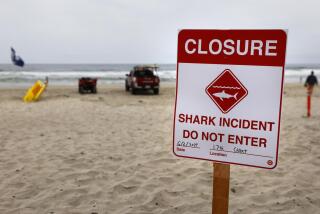Shark bite victim will be swimming closer to shore
A man who was bitten on his legs by what one expert suspects was a great white shark says he plans to go back into the water, but it may take “some gentle effort” to get him there.
“I think I might ... try swimming a little closer to shore,” Christopher Myers told “Good Morning America” on Wednesday. Myers escaped from the jaws of a predator two days earlier as he and his son, J.J., swam off Cape Cod in Massachusetts. Myers looked cheerful in the interview, sitting in a hospital wheelchair with both legs heavily bandaged below the knee and his son at his side.
He said they were farther from shore than usual as they looked for a good body-surfing spot at Ballston Beach in the town of Truro. They were headed for a sandbar and had to swim through some deep water to get there. That’s when J.J. heard his father scream.
PHOTOS: Sharks and people, too close for comfort
“I turned around and I kind of saw the back and the fin of the shark,” said J.J. during the interview. “At that point, it hit me that it was happening. At the same time, I felt like none of it was real ... it just really seemed like a movie.”
The shark let go of his father, and the pair quickly began swimming toward shore. “We really didn’t have a whole lot of options, and were very motivated, so we swam -- hard,” Christopher Myers said. “My only concern was would we be able to make it back to shore.”
They made it to land as witnesses were dialing 911 to report an apparent shark attack. Myers was met by medical personnel, strapped onto a stretcher and carried to an ambulance minutes after reaching the sand.
Intentional shark attacks on humans are rare; the predators are more interested in seals. Marine biologists say that when a shark attacks a human it’s usually because the shark has mistaken the person for a seal.
The Cape Cod area has been buzzing with shark sightings this summer, something marine biologists attribute to the large number of seals in the water.
Greg Skomal, a shark expert with the Massachusetts Division of Marine Fisheries, said he doubted that one of the region’s coastal sharks, such as a mako, blue or porbeagle, would attack a swimmer. That makes the great white shark, made famous in the 1975 movie “Jaws,” “the most likely candidate,” Skomal said.
The teeth marks left by the shark should provide a definite answer, shark expert George Burgess, curator of the International Shark Attack File in Florida, told the Cape Cod Times.
“They are very distinctive teeth,” Burgess told the newspaper, describing the great white’s teeth as serrated, like a knife. Burgess also said most great white, or white, shark attacks are from below and behind, as occurred with Myers.
Myers said he had been swimming at Ballston Beach all his life but urged people to be “a little more careful than I was.... Don’t be an easy meal.”
The last documented fatal shark attack off New England was in 1936.
ALSO:
Tombstone of boys who died in 1871 finally returns home
Federal workers who haven’t paid taxes might need new jobs
Win Olympic gold medal by losing? 9 other ways to cheat in sports
More to Read
Sign up for Essential California
The most important California stories and recommendations in your inbox every morning.
You may occasionally receive promotional content from the Los Angeles Times.











